Overview
Are you feeling low on energy? You're not alone. Many of us struggle with maintaining our vitality in our busy lives. The good news is that certain essential nutrients can help boost your energy levels and overall well-being.
- Vitamin B12: A powerhouse when it comes to energy conversion and the formation of red blood cells. Imagine how much more vibrant you could feel with the right support!
- Iron: Equally important; it plays a crucial role in transporting oxygen throughout your body and supporting energy metabolism.
- Magnesium: Vital for ATP production and muscle function.
Together, these nutrients work harmoniously to enhance your vitality and energy levels.
Consider taking a closer look at your diet. Are you getting enough of these essential nutrients? By prioritizing Vitamin B12, Iron, and Magnesium, you can take meaningful steps towards feeling more energized and revitalized. Let's embark on this wellness journey together, ensuring you feel your best every day!
Introduction
Energy levels can often feel elusive, influenced by a myriad of factors, including diet, lifestyle, and overall health. You might be wondering how to navigate these complexities. Among the key players in energy production are:
- Vitamin B12
- Iron
- Magnesium
Each offering unique benefits that contribute to your vitality. Imagine feeling more energized and ready to tackle your day! This article delves into the distinct roles these nutrients play in enhancing energy levels and overall well-being, revealing how a better understanding of their functions can empower you to make informed dietary choices. But with so many options available, how can we determine which supplement is truly the best for combating fatigue and boosting energy? Together, let’s explore this journey to better health.
Key Vitamins and Minerals for Energy Production
Energy production in our bodies relies on several key vitamins and minerals, with Vitamin B12 being a crucial vitamin for energy, along with Iron and Magnesium. These nutrients, particularly the vitamin for energy, play distinct yet interconnected roles in our metabolic processes, and understanding them can significantly impact our vitality.
- Vitamin B12 is essential for forming red blood cells and synthesizing DNA. It’s crucial as a vitamin for energy, converting food into energy, supporting our neurological function, and helping to prevent fatigue. Imagine if you could feel more energized simply by ensuring you get enough of this vital nutrient.
- Iron is a vital component of hemoglobin, responsible for transporting oxygen throughout our bodies. Without sufficient iron, we may struggle to maintain our vitality, particularly if we lead active lifestyles. Have you ever felt unusually tired during a workout? It might be time to check your iron levels.
- Magnesium participates in over 300 enzymatic processes, including those that generate ATP (adenosine triphosphate), the main carrier of energy in our cells. It also helps regulate muscle and nerve function, contributing to our overall vitality.
By comprehending these nutrients, including the vitamin for energy, we can make informed decisions about our supplementation and dietary intake, ultimately supporting our vitality needs. Together, let’s take the next step in our wellness journey by prioritizing these essential nutrients in our daily lives.
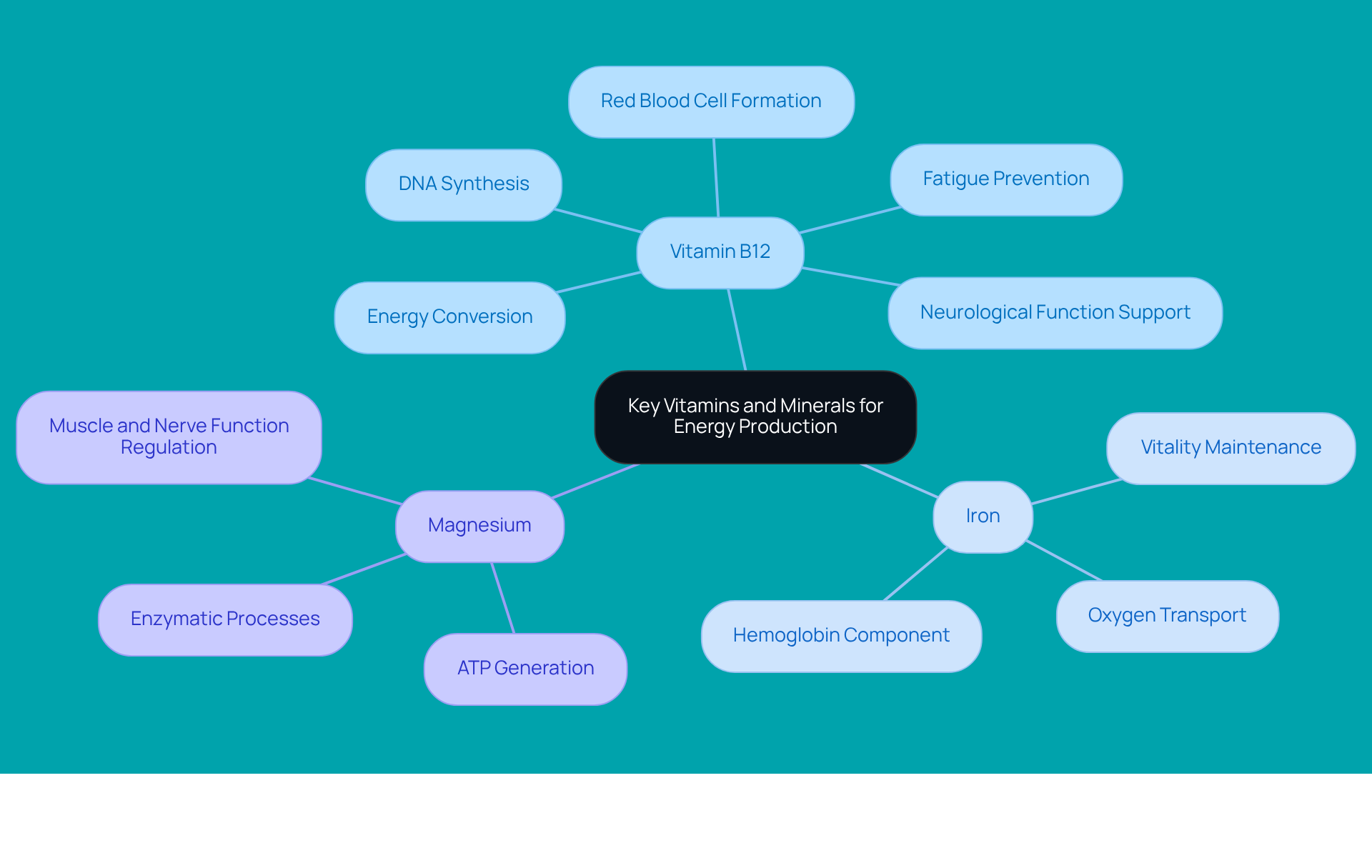
Vitamin B12: Role and Benefits for Energy
Vitamin B12, often called cobalamin, is a vital water-soluble vitamin that plays an essential role in our metabolic processes. You might be wondering how it affects your daily life. Let’s explore its primary functions together.
- Energy Conversion: Imagine converting carbohydrates into glucose, the energy source your body craves. B12 is crucial for this process as it acts as a vitamin for energy, aiding in the metabolism of fats and proteins.
- Red Blood Cell Formation: Think about the importance of red blood cells; they are responsible for transporting oxygen throughout your body. B12 is key to producing these cells, ensuring you have the oxygen needed to sustain your vitality and avoid feelings of fatigue.
- Neurological Health: This remarkable vitamin also supports the health of your nerve cells. It plays a role in synthesizing neurotransmitters, which can significantly influence your mood and cognitive function.
If you're experiencing fatigue, weakness, or even neurological issues, it might be time to consider your vitamin for energy, such as Vitamin B12 levels. Deficiency can affect anyone, but it’s particularly important for vegetarians, vegans, and older adults to monitor their intake. Together, we can take proactive steps towards better health, and supplementation might be a beneficial option for you. Remember, your wellness journey is important, and understanding your nutritional needs is a key part of it.
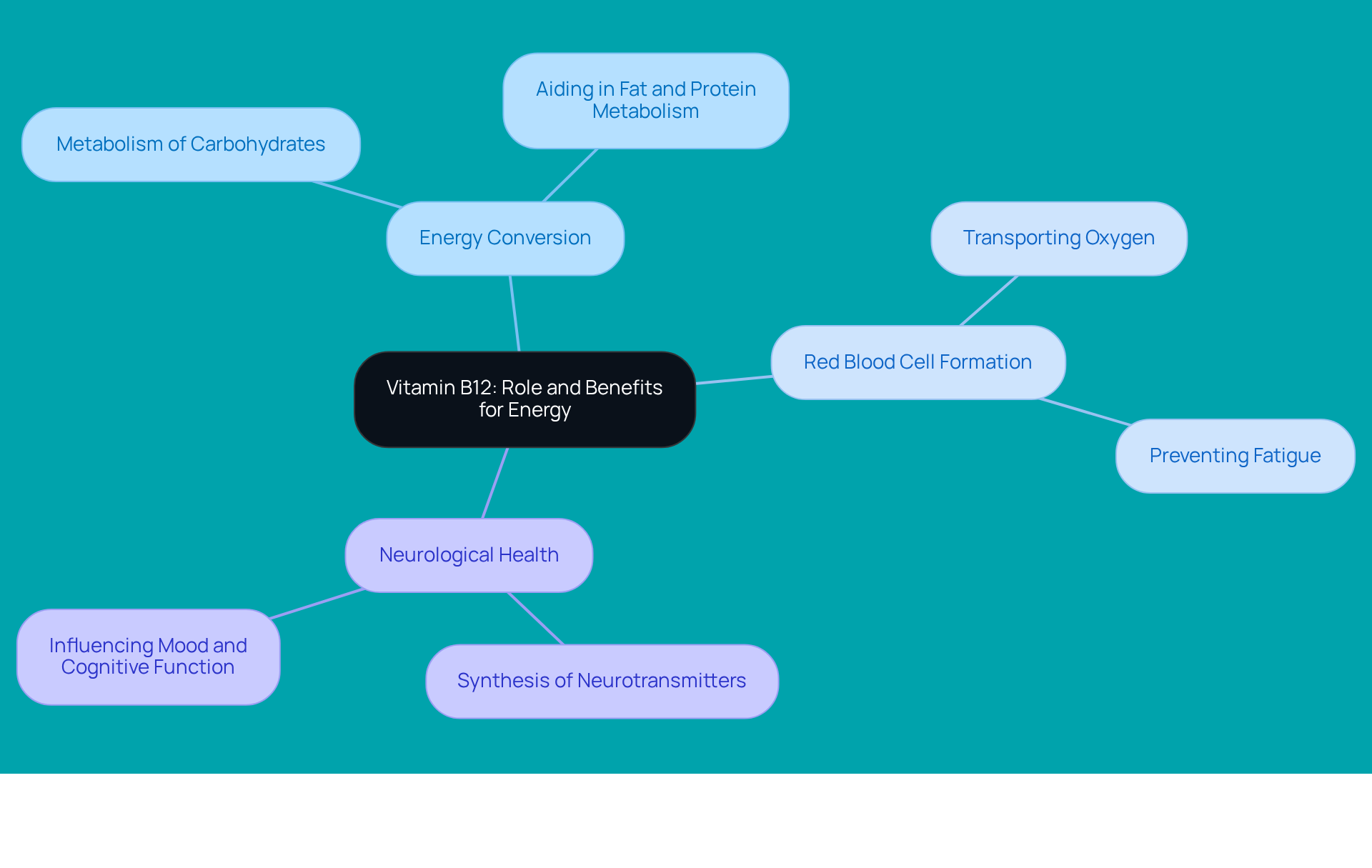
Iron: Importance for Energy Levels
Iron is a vital mineral that serves as a key vitamin for energy production and plays a crucial role in many of our body's functions. You might be wondering how it impacts your daily life. Let's explore its key roles together:
- Oxygen Transport: Imagine how essential oxygen is for your body. Iron is a core component of hemoglobin, the protein in red blood cells that carries oxygen from the lungs to the rest of your body. Adequate oxygen levels serve as a vital vitamin for energy generation in your cells.
- Energy Metabolism: Iron acts as a cofactor for enzymes involved in metabolism, helping to transform nutrients into usable fuel, making it a vital vitamin for energy. This means that iron supports your body in making the most of the food you eat.
- Prevention of Fatigue: Have you ever felt unusually tired? Low iron levels can lead to iron deficiency anemia, which is characterized by fatigue, weakness, and decreased exercise performance. For those with low iron reserves, supplementation can significantly enhance vitality.
It's important to note that athletes and individuals with significant menstrual cycles are particularly vulnerable to iron deficiency. Tracking your iron intake can be a simple yet effective vitamin for energy to help sustain optimal energy levels. Together, we can ensure that you feel your best every day.
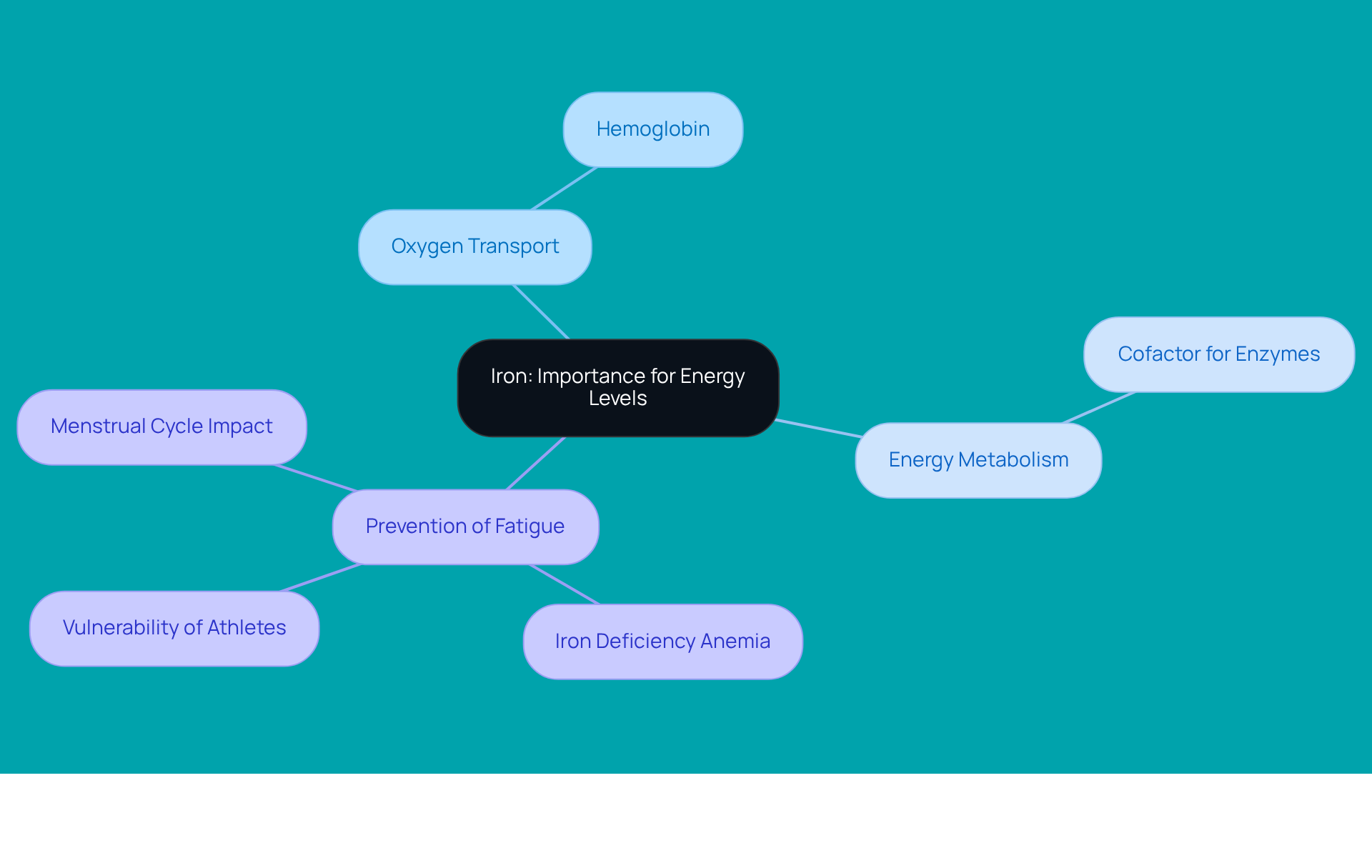
Magnesium: Contribution to Energy and Health
Imagine a vitamin for energy that is crucial for your body's energy production and overall vitality. Magnesium is that essential element, supporting various biochemical processes that are vital for your well-being. Its contributions include:
- ATP Production: Magnesium is key in synthesizing ATP, the primary energy currency of our cells. It helps transform glucose and fatty acids into usable energy, making it a crucial vitamin for energy to achieve peak physical performance.
- Muscle Function: This mineral is integral to both muscle contraction and relaxation, which are critical for physical activity and recovery. Ensuring you have enough magnesium can help prevent muscle cramps and enhance your athletic performance.
- Nervous System Support: Magnesium also plays a role in modulating neurotransmitters, which can impact your mood and cognitive function, indirectly influencing your overall vitality.
You might be wondering about the current state of magnesium intake. Statistics reveal that approximately 45% of Americans are magnesium deficient, with over 90% not getting enough from their diets. This deficiency can lead to feelings of fatigue, muscle cramps, and irritability. Nutritionists often recommend magnesium supplementation as a vitamin for energy, especially for those who engage in regular physical activity, as it can significantly enhance vitality and overall health. Many athletes report improved recovery and performance when they incorporate magnesium into their routine.
When considering supplementation, can be particularly beneficial. For instance, magnesium glycinate is known for its calming effects and good absorption, while magnesium citrate boasts high bioavailability. Together, these can help ensure you meet your magnesium needs, whether through diet or supplements.
Remember, ensuring sufficient magnesium consumption is vital for sustaining your vitality and serves as a vitamin for energy to promote your overall health. Let’s take this step together towards a healthier you!
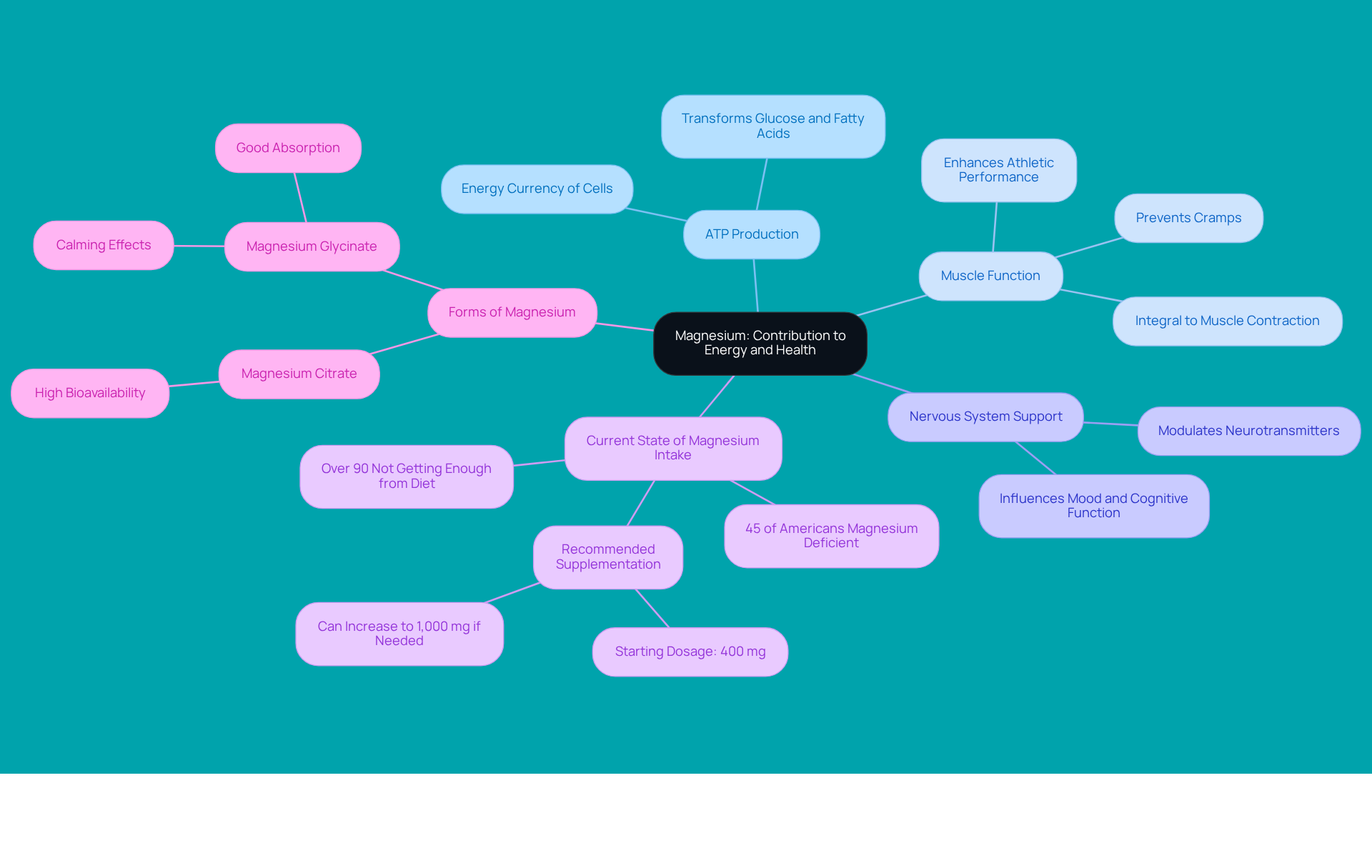
Comparative Analysis: Choosing the Right Supplement for Energy
When considering supplements for energy, it’s essential to evaluate the unique benefits and roles of , Iron, and Magnesium as a vitamin for energy. Each of these nutrients plays a vital part in our overall well-being, and understanding them can help you make informed choices.
- Vitamin B12 is a vital vitamin for energy conversion and red blood cell formation. You can find it in sources like meat, dairy, and fortified cereals. If you’re feeling fatigued, weak, or experiencing neurological issues, it may be a sign of a deficiency.
- Iron is an essential vitamin for energy, playing a crucial role in oxygen transport and energy metabolism. Common sources include red meat, beans, and spinach. If you often feel tired or weak, especially if you’re a woman or an athlete, you might need to consider iron supplementation. Just remember, too much iron can lead to upset stomach and nausea, so it’s important to manage your intake carefully.
- Magnesium acts as a vitamin for energy, supporting ATP production, muscle function, and nervous system health. You can get magnesium from nuts, seeds, and whole grains. If you’re dealing with muscle cramps or stress-induced fatigue, magnesium may offer the relief you need.
Choosing the right supplement is about understanding your individual health needs, dietary habits, and potential deficiencies. Imagine if you could optimize your energy levels—consulting with a healthcare provider can help tailor supplementation to your unique situation. Together, we can find the best path to enhancing your vitality.
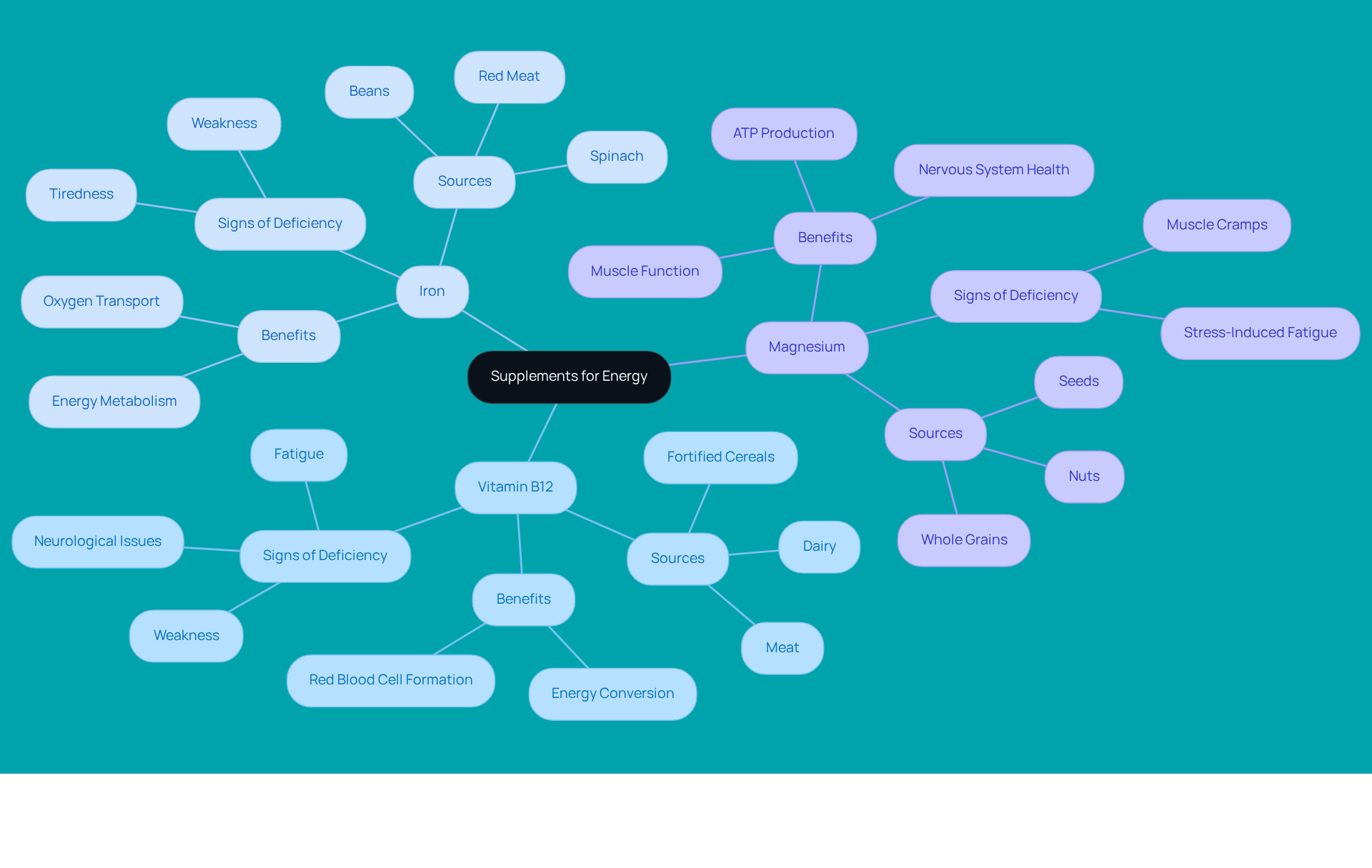
Conclusion
Understanding the critical roles of Vitamin B12, Iron, and Magnesium in energy production reveals how essential these nutrients are for maintaining vitality. Each of these components contributes uniquely to our body's ability to convert food into energy, support vital functions, and prevent fatigue. Imagine how prioritizing these vitamins and minerals could enhance your overall well-being and energy levels.
Let’s explore the distinct functions of these nutrients together:
- Vitamin B12 is key for red blood cell formation and neurological health.
- Iron is crucial for oxygen transport and energy metabolism.
- Magnesium supports ATP production and muscle function.
You might be wondering if you’re experiencing any signs of deficiencies in these areas. Recognizing them can empower you to make informed dietary choices or consider supplementation, ensuring you meet your energy needs.
Ultimately, the journey towards optimal energy levels begins with understanding and addressing your nutritional needs. By evaluating your personal health requirements and seeking guidance from healthcare providers, you can tailor your intake of Vitamin B12, Iron, and Magnesium. This proactive approach not only boosts energy but also fosters a healthier lifestyle. Together, let’s make it essential to incorporate these vital nutrients into our daily routines for enhanced vitality and overall health.
Frequently Asked Questions
What are the key vitamins and minerals important for energy production?
The key vitamins and minerals important for energy production are Vitamin B12, Iron, and Magnesium.
What role does Vitamin B12 play in energy production?
Vitamin B12 is essential for forming red blood cells, synthesizing DNA, converting food into energy, supporting neurological function, and preventing fatigue.
How does Iron contribute to maintaining energy levels?
Iron is a vital component of hemoglobin, which transports oxygen throughout the body. Sufficient iron levels are crucial for maintaining vitality, especially during physical activities.
What is the function of Magnesium in energy production?
Magnesium participates in over 300 enzymatic processes, including ATP generation, and helps regulate muscle and nerve function, contributing to overall vitality.
Why is it important to understand these nutrients for our health?
Understanding these nutrients allows us to make informed decisions about supplementation and dietary intake, ultimately supporting our energy and vitality needs.
What are the primary functions of Vitamin B12?
The primary functions of Vitamin B12 include energy conversion from carbohydrates, red blood cell formation, and supporting neurological health by synthesizing neurotransmitters.
Who should monitor their Vitamin B12 intake?
Individuals who should monitor their Vitamin B12 intake include vegetarians, vegans, and older adults, as they may be at higher risk for deficiency.
What symptoms might indicate a Vitamin B12 deficiency?
Symptoms of Vitamin B12 deficiency can include fatigue, weakness, and neurological issues.




